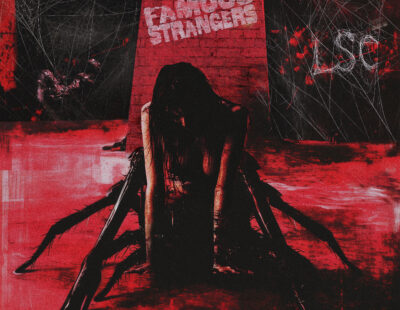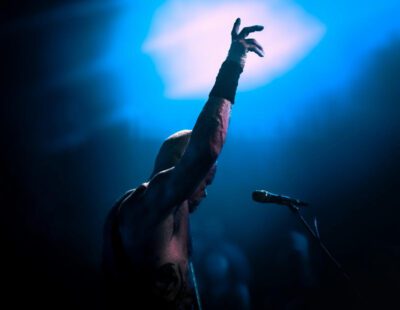
There’s more to Dan Jackson than just Void Ritual — but we should be thankful for his one-man black metal project anyway. The first of two Void Ritual albums this year, Death is Peace ignores the hazy, depressive, and scraped-raw vibes of so many ‘bedroom’ projects in favor of lush, melodic and super catchy songs. It’s one of the best black metal releases this year, which is sort of funny because Jackson also released one of the best grind albums I’ve heard in 2018: Hug Division Dead Wretch, an album as dismissive of black metal as Void Ritual is adoring of it. How does Jackson square that circle? Read this interview while listening to “In the Depths” from the upcoming Death is Peace to find out.
Death is Peace is out on August 3 via Ipos Music. Order it here.
Many underground black metal bands that, like Void Ritual, openly worship at the altar of 90s black metal go for a raw sound—but Death is Peace and the Holodomor EP before it are relatively clear, melodic, and have touches like acoustic guitars, etc. why did you decide to go that route?
I think generally I just try to come up with a recording quality that makes sense for the music itself. Especially with Death is Peace, it felt like the sort of music that would have a harsh texture to it, but with the different guitar layering and the way some of the chords play off of each other; it felt like there needed to be some clarity to it for everything to be heard and come through for the person listening. This new album has more going on musically than ever before, with keyboards (choir voices, harp sounds, piano etc.) playing a supporting role at various points, so I wanted a sound that would fit with those elements in play too.
The track we’re premiering today is “In the Depths”—what is the most essential thing to know about this song?
That it acts as a sort of capsule-sized version of the whole album. There’s the keyboards at the beginning, the bleak, Holodomor-style chords when everything first comes in, the more melodic second section with some drumming patterns that you won’t typically find in a black metal song, before it all comes around again. And the lyrics work in that same way: it’s all about trying to cope with real loss. The constant emotional ache that comes with it, the struggle to move on, the failed attempts to use escapism to provide relief, and the feeling that you’re letting everyone down by not feeling better.
Let’s go back to Holodomor for a second, the EP’s name references the Ukrainian famine that killed millions in the ’30s—how did you come across that historical moment and why did you decide to write an EP about it?
It was kind of just by chance. At the start of Void Ritual, the music I was writing tended to be a fair bit darker and uglier. I wanted the lyrics for the album to bear that out in words, and so I started looking into human atrocities, and there’s obviously no shortage of those throughout history. The incredible cruelty of something like forced starvation fit what I believed to be the emotional tone of the music. I wrote about Holodomor more from a visceral,emotional headspace, than from any real historical context. That’s because I’m not really qualified to do anything other than react to something like that emotionally.
Proceeds from the sale of Death is Peace are going to The Coalition to Stop Violence Against Native Women—why did you select that charity to work with?
Living in Albuquerque, the Native population is so strong here and indigenous culture is woven into the fabric and personality of everything in New Mexico, so it made sense to donate the money to a cause that would directly help people locally. I chose this specific charity after speaking to Becki, my coworker, about her recommendation for a cause that helps Native communities. I’ve included their mission statement from the CSVANW website, which explains a bit about what they do:
“To stop violence against Native women and children by advocating for social change in our communities. The CSVANW takes ownership and responsibility for the future of Native women and children by providing support, education, and advocacy using our strengths, power and unity to create violence-free communities.”
That’s not the only charity you’re working with—I love the Dead Wretch album you also put out this year, and proceeds from that went to the Transgender Resource Center of New Mexico, what’s your connection with that cause?
I work for a reproductive healthcare provider, answering phones, scheduling appointments, answering general questions about STD testing, other infections, birth control, abortion and so on. One of the calls I started getting more and more frequently was for Transgender people looking for help, specifically for hormone replacement therapy. Unfortunately, the offices I work for don’t currently offer those specific services in New Mexico, and the providers that do are few enough that you start hearing about how awful and long the wait is to get people the care they need.
That’s where the Transgender Resource Center of New Mexico comes in. They maintain a list of providers that can help, while also providing a place where trans and non-binary people can go for support, and get help with other non-medical needs. Trans and non-binary folks have to work incredibly hard just to exist and navigate a world that is so often hostile to them, and any organization that offers a way to make that navigation easier should get all the help we can offer.
That Dead Wretch is also very loving toward older extreme metal—I’m thinking the song about Witchery— but is also openly mocking of black metal’s racist past and rightly so. How do you square your love for the music with its racist past, personally?
I think it’s because the music itself doesn’t really care what message it’s used to convey. Black metal can be a vessel for racist horseshit, or it can be used as a vessel for the upending of these conservative Christian values that a lot of these NSBM bands tend to hold, socially.
But more to your question, I just try to focus on bands who don’t swim in that shit. For me personally, if I spend more time thinking about the awful shit your band member has said or done than the music itself, I’m probably just going to listen to something else.
You’re releasing another album this year. How do you maintain this prolific pace?
The truth is that Death is Peace was recorded musically last year. I’ve kind of developed a backlog of music I’ve recorded over the last 2 years or so, and I’m just now completing things one at a time. So the next album is stuff I’ve been working on since the start of this year. I’ll just keep going until I stop feeling like I have something to say through music.
What can you tell us about those future albums and their relationship with Death is Peace?
That’s interesting, because there’s a couple of ways it could go. I have one album that’s almost finished that’s wildly different from everything else, with a lot of classic metal and even rock elements to it, and another that’s a complete retreat back into something raw and Holodomor-esque. We’ll just have to see what comes up first.
The prolific Dan Jackson strikes again with a charitable slab of melodic, powerful black metal from Void Ritual’s upcoming album ‘Death is Peace’







